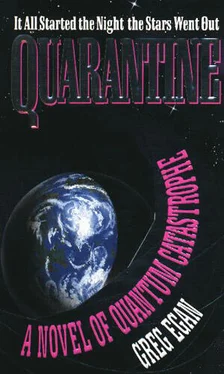'Then there's the many-worlds theory — '
'Alternative histories, parallel universes …'
'Exactly. In the many-worlds theory, the wave function doesn't collapse. The entire universe splits into different versions, one for every possible measurement. One universe has a dead cat, and an experimenter who saw that it was dead; another universe has a live cat, and an experimenter who saw that it was alive. The trouble is, the theory doesn't say why any of this should happen — or even at what point the universe splits. Detector? Bottle? Cat? Human? It doesn't really answer anything.'
'Maybe there are no answers; maybe it's all just a metaphysical quibble — '
She shakes her head. 'Metaphysics has been an experimental science since the nineteen eighties. Although, personally, I'd like to think that the field really began in earnest from today.' She glances at her watch. 'Sorry, yesterday. Tuesday, the twenty-fourth of July, two thousand and sixty-eight.'
She waits patiently — with a faintly smug grin — until it hits me:
'In the brain? Somehow, you've shown that the collapse of the wave function happens in the brain?'
'Yes.'
'But … how? What's any of this got to do with influencing the ions, making them all go one way? Aren't you using some kind of electromagnetic effect — '
'Wow! No biological field could be strong enough — '
'That's what I thought. But — how, then?'
"The mod does two things. The first one is, it stops me collapsing the wave function; it disables the parts of the brain that normally do so. But if that was all it did, the ions would still be random, fifty-fifty … it's just that it would be you, Leung, Tse and Lui who'd be collapsing the system, instead of me.
'But the mod also allows me to manipulate the eigen-states — now that I no longer clumsily, randomly, destroy all but one of them. It lets me change their relative strengths — and hence change the probabilities of the experiment's possible outcomes.
'In theory, I suppose I could then collapse the wave function myself — but it'd make the experiment less elegant to have the same person do both. So, the people in the control room collapse the whole system — which includes the silver ion, the fluorescent screen, and me — but only after I've changed the odds so they're no longer fifty-fifty.'
'So … everyone in the control room is part of the experiment? That's why the histograms don't change until after you've spoken the ion's direction — because if we knew the results before you'd had a chance to influence the probabilities, we'd collapse the ions randomly?'
'That's right.'
I think it over for a moment. 'You say we collapse "the whole system". So you exist as a mixture, until we hear your voice?'
'Yes.'
'And what does that… feel like?'
She laughs. 'That's the most frustrating thing of all: I don't know! I literally don't remember. Once I'm collapsed, I end up with only one set of memories; I only recall seeing one flash of light on the screen. I don't even remember what it's like to operate the eigenstate part of the mod… Didn't you ever wonder why it was taking me so long to make the thing work? And I don't know if I ever "see" two flashes, even for a moment; I suspect that my two states evolve too independently for that. What happens may be a bit like the many-worlds model, on a very small scale. Effectively, there may be two almost separate versions of me — if only for a fraction of a second before I'm collapsed. But whatever goes on in the rest of my brain, the two states of the mod definitely do interact — their wave functions interfere, strengthening one eigenstate and weakening the other. If not, the whole experiment would come to nothing — it would be just a metaphysical quibble.'
I hesitate, bemused, and try to back-track through the discussion to the point where it derailed from reality. Finally, I say, 'Are you serious about any of this? You're not just stringing me along for a joke? Paying me back for crashing into your room? Because if that's it, you've won — I concede defeat. You've got me to the point where I can't tell which parts are genuine, and which parts you're making up.'
She looks hurt. 'I wouldn't do that. Everything I've told you is the truth.'
'It's just… this is all beginning to sound like the kind of gibberish the quantum mystics spout — '
She shakes her head vehemently. 'No, no — they claim there's some non-physical element to consciousness — something independent of the brain, some ill-defined "spiritual" entity which collapses the wave function. Yesterday's experiment proved them absolutely wrong. The parts of the brain which the mod disables don't do anything mystical; they perform a sophisticated — but perfectly comprehensible, perfectly physical — action.
'I know it all sounds bizarre — but the whole point is that, in fact, it's utterly commonplace. Everyone spends their whole life collapsing the systems they interact with. That's a very old idea; many of the pioneers of quantum mechanics believed that the observer had a crucial role to play — that a measuring device alone wasn't enough to collapse the wave function. But it's taken more than a century to pin down exactly where in the observer it happens.'
I still don't know whether or not to believe a word of this — but she seems convinced, so at the very least, it's worth understanding precisely what she believes. I put aside my scepticism, and struggle to catch up.
'Okay… so a "measuring device" isn't enough, you have to have an "observer" — but what constitutes an observer? People, yes … but what about computers? What about cats?'
'Ah. Existing computers, definitely not. Collapsing the wave function is a specific physical process — not an automatic by-product of a certain degree of intelligence, or self-awareness, or whatever — and computers simply haven't been designed to do it … although no doubt some will be, in the future.
'As for cats… my guess would be that they do it, but I'm not exactly an expert on comparative neurophysiology, so don't take my word for it. It may be years before anyone gets around to finding out exactly which species do and don't. Then there's the whole question of the evolution of the trait — and just what "evolution" meant in an uncollapsed universe. People are going to spend decades unravelling all the implications.'
I nod dumbly — and hope that she'll shut up for a moment, while I try to unravel a few implications myself. If all of this is true, what does it tell me about Laura? Could 'manipulating eigenstates' let her pick locks and elude security cameras? Maybe … but how could a chance mutation, or a random congenital abnormality, grant her such elaborate skills? The mere loss of the ability to collapse the wave function, yes — random damage can easily produce deficits. But what are the odds of brain damage resulting in the kind of sophisticated powers that Po-kwai claims the mod provides? And yet, Laura must have those powers; how else could she have escaped from the Hilgemann? And how else could the mod itself provide them? I can't believe that BDI designed the whole thing from scratch — in six months — simply by studying the normal human trait that Laura was missing.
So, which is more preposterous: BDI inventing the neural manipulation of eigenstates, in less time than most companies take to develop a new games mod… or a random event handing Laura — and BDI — the finished product on a silver platter?
Po-kwai continues, 'It's a pretty sobering thought, though: until one of our ancestors learnt this trick, the universe must have been a radically different place from the one we know. Everything happened simultaneously; all possibilities coexisted. The wave function never collapsed, it just kept on growing more and more complex. And I know it sounds ludicrously — grandiosely — anthro-pocentric… or geocentric… to think that life on this one planet could have made such a difference, but with so much richness, so much complexity, perhaps it was inevitable that, somewhere in the universe, a creature would evolve which undermined the whole thing, which annihilated the very diversity which had brought it into being.'
Читать дальше










